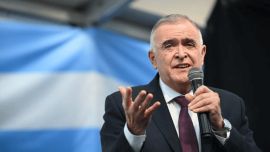Sergio Massa walks in a labyrinth with multiple exits. Argentina’s economy minister is still among the possible options being considered within the ruling Frente de Todos coalition for this year's presidential ticket, but the promised miracle of containing price hikes is taking longer than expected and this could frustrate his dream. The upcoming March inflation figure, which will be known imminently, could start with a 7 and indicate a rise in consumer prices for a fourth consecutive month.
According to the INDEC national statistics bureau, economic activity started the year with a 2.9 percent year-on-year growth in January and almost all sectors of the EMAE (Monthly Estimator of Economic Activity) recorded year-on-year increases at the beginning of 2023. But the impact of the drought on the agricultural sector – the main engine for injecting dollars into the local economy – forecast devastating effects (production for this year would be around 50 percent less, in dollars, than last year).
In this context, Massa is navigating turbulent waters, between the micro of local politics and a worrying inflationary scenario. Social Development Minister Victoria Tolosa Paz assures that the poverty figures for the second half of 2022, close to 40 percent, are the product of the inflationary spiral that makes "growth reach few pockets" – a script repeated incessantly in recent months by hard-line Kirchnerites – and a macroeconomic horizon that is increasingly worrying and that is tied to the minister's creativity.
The rumours about Massa will not go away and the news of the last few weeks has plagued the Frente Renovador leader and, in more general terms, the leadership of the Frente de Todos coalition. But the official still has one more card to play: focus groups and studies show that society recognises his efforts within a government characterised by inactivity and internal political bickering. This has even been ratified by the campaign team of Horacio Rodríguez Larreta, the moderate candidate from the opposition Juntos por el Cambio coalition.
In this sense, Cristina Fernández de Kirchner is still betting on Massa's candidacy if her own decision not to be a candidate holds, despite the fact that there are all kinds of internal versions of what may happen. A part of her entourage – those very close to her – stresses, for example, that we still have to wait.
In this tsunami of internal bickering, Massa's candidacy is still alive and well. What's more, it appears that April will be key and that efforts are being made to pave the way for a single ticket within the Frente de Todos. Massa and Interior Minister Eduardo ‘Wado’ de Pedro appear in this context as two leading actors. Another name that has been added these days is that of Pablo González, a native of Santa Cruz who currently presides over the state-owned oil company YPF. In the last week of March, González travelled to El Calafate at Cristina's request to discuss his political future.
Another who has joined the race is Daniel Scioli, who had to return to Brazil when Massa landed with his team and took over the Economy Ministry. If Massa runs, will Scioli drop out? The ex-Tigre mayor did not like the fact that Scioli has been quick to declare his intentions to run. If Massa moves forward with his presidential ambitions, should he step aside and leave the ministry in the command of his own deputy? Alberto Fernández would then have to swear in the fourth economy minister of his four years in office.
A few days after taking office, Massa said that his family, especially his children, did not want him to be a presidential candidate in 2023. And in January earlier this year, he referred to those who speculate that his Casa Rosada run is tied to his results at the Economy Ministry. At the same time, Massa’s wife, Malena Galmarini, has already announced that she wants to run for mayor of Tigre and is working towards that goal. It will be a busy year in the Massa household.



















Comments